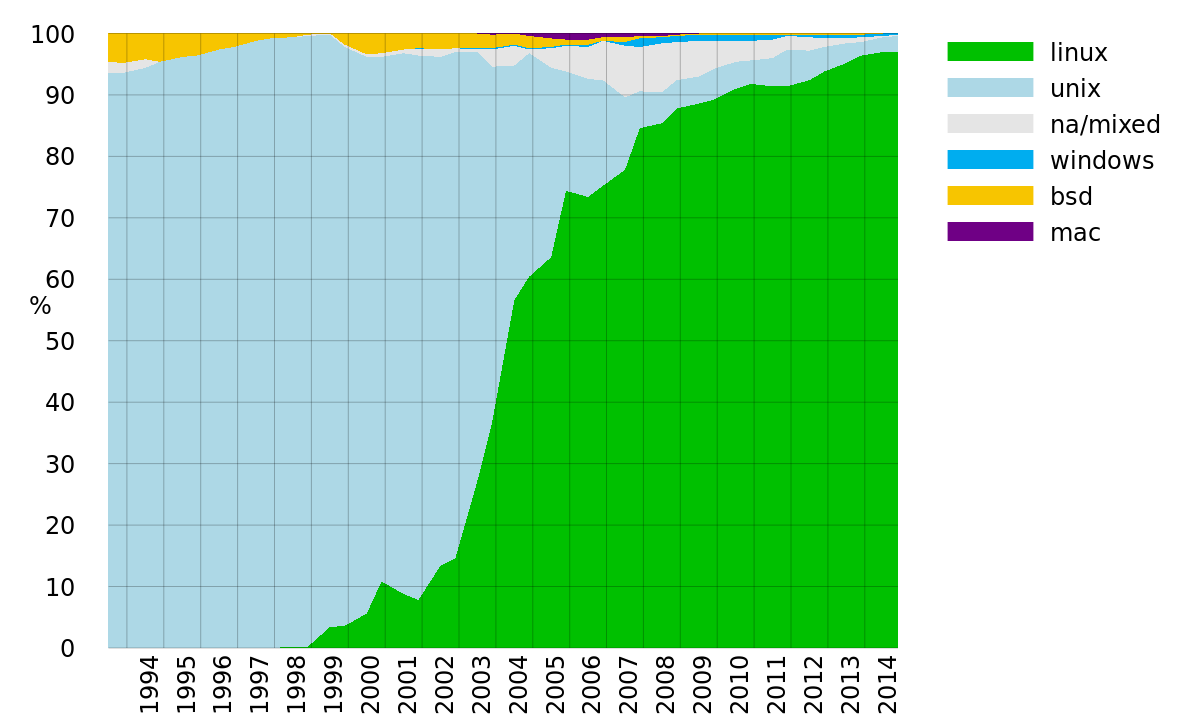Meet Tux, the Linux mascot

Linux is the most powerful, most versatile and most widely used operating system in the world. It's also Open Source and available to everyone for free.
Linux is the best example of an Open Source project. Created initially by an amalgamation of the work of two principle people on different continents, now 10,000 programmers and over 1000 companies have contributed to its development
Linux is a hugely important piece of software and yet most people use it every day knowing little or nothing about it.
It drives the Internet, being the most used operating system on Internet servers and routers. It probably powers your broadband router, and is the basis of the Android phone operating system.
Super Computers
Linux now powers 97% of the world's top 500 super-computers. It's share has risen dramatically every year from its 0.2% in 1998. By contrast Microsoft Windows runs on only one. Statistics from top500.org.

Who uses Linux?
Besides most Internet companies, computer systems in many large organizations are powered by Linux:
-
NASA
-
The US Department of Defence
-
The French Gendarmarie
-
The London and New York Stock Exchanges
-
Film studios such as Disney Pixar and Dreamworks use Linux to create their CGI films.
Many of those examples include Linux as a Server operating system run on computers that aren't directly accessed by users but merely provide services to them – think of a web page being served to your web browser or email to your email client such as Microsoft Outlook.
However, there are also many desktop versions of Linux that can run on a standard PC as an alternative to Microsoft Windows. The most popular version on the desktop is Ubuntu, but there are also variations of Ubuntu such as Linux Mint and Elementary OS that strive to improve the user's experience and enjoyment of using a computer.
It is because Linux is Open Source that so many different variations have been created. None of them had to start from scratch and they all have access to each other's code, but Linux can be made to do whatever anyone wants it to do and look exactly how they want it to look. Non-programmers simply benefit from the wide choice available at no cost.
Proprietary systems such as Windows and MacOS don't allow the freedom that makes Open Source software so versatile and tend to remove choice from their users as they develop. Some might argue that's a good thing, because too much choice is confusing, but we like choice when it comes to cars, food, clothes, even PCs. The EU even decreed that we should have a choice of Web Browser, forcing Microsoft to make us aware that other brands were available, so why not a greater choice of operating systems?
And consider this, if Windows XP had been open source, it would probably still be around today for the large number of people who simply prefer it to the later offerings from Microsoft and who really won't like Windows 10.
Articles
Control your Data
Do you want the advantages of the Cloud without putting your data on someone else's server?
Windows XP
Do you still use Windows XP and if so, what are your options?
Servers
No matter how big or small your network, a Server can make your life easier.
History of Open Source
The term Open Source is gradually seeping into the public consciousness, but what's it all about?
Linux
Linux is the world's most important operating system
Dalek
The Dalek Project
